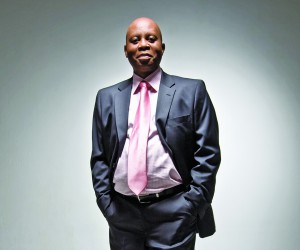
Darkness covered the land, breaking men’s spirits and stifling their dreams. Apartheid hung like a huge, unwashed blanket, shutting out the sun of life, love, brotherhood and humanity. “No Blacks allowed,” the signs read, effectively placing the black man in the same category as beasts of the field. They should have also said, ‘No dreams allowed,’ ‘No hopes allowed,’ ‘No future allowed!’
From the ashes of rejection and the constant chipping away at the black man’s self-esteem, Herman Samtseu Philip Mashaba rose. Not for him the dreary life of forced servitude and hopelessness; not for him the cowering and trembling; Herman Mashaba, born 26 August, 1959, rose and dared to dream, hope and work for a better future.
Herman came from humble beginnings to become one of South Africa’s wealthiest and best-known entrepreneurs. His inspiring tale began in the small village of Hammanskraal in Gauteng where his impecunious family struggled to get by; his sisters raised him while his absent domestic-worker mother worked long hours to provide what little she could. This little boy with holes in his shoes and a life which seemed to be brim-full of adversity would eventually be compelled to drop out of University, courtesy of the restrictive apartheid regime.
He went on to discover his talent as a salesman, and began to sell different products on a commission basis from the boot of his car for close to two years. His products portfolio ranged from insurance, fire detection systems, linen, crockery, dinner services, etc ; however, his market was limited by the Group Areas Act –another demeaning apartheid law.
Herman’s eureka moment came in 1983 when he was employed as a Sales Rep and sold hair products on a commission basis for a Cosmetic company in Johannesburg. Of this experience Herman narrates thus in his autobiography ‘Black Like You’:
“The company owner’s wife introduced herself as Mrs Thompson, and said to me, “Mr Mashaba, we were actually advertising for a white salesman”. I felt disappointed, but thanked her anyway. Then, after a pause, she continued: “But come and visit our factory anyway, and my husband can interview you.” Once I arrived at the factory, though, my misgivings were cast aside. The place was a hive of industry, with machines spitting out lotions and potions, threaders sealing bottles and conveyor belts delivering different-coloured bottles to packaging stations. Colleen Thompson introduced me to her husband, Leon. He took me on a tour of the factory and then invited me into his office for refreshments. Over a cup of tea, he explained SuperKurl’s areas of operation and I realised that I had at last found products that offered sustainable sales. But, most importantly for me, SuperKurl was a brand I believed in at a time when salons were mushrooming all over – in villages, townships and cities. No further mention was made of the fact that SuperKurl was looking for a white salesman.
In less than a year I was SuperKurl’s top salesman.”
It took him 19 months to make up his mind to start his own hair care manufacturing business, and after that, there was no retreat for Herman. “In 1984, blacks and whites rarely had any kind of social interaction, and it was certainly unheard of for a black man to approach a white man to join him in business,” recalls Herman in his autobiography. “Kriel [A white Afrikaner and his business partner] came up with a perm lotion that substantially reduced the normal production time, allowing ‘Black Like Me’ to compete with SuperKurl.” Herman, Kriel and an old workmate at SuperKurl, Joseph Molwantwa, launched ‘Black Like Me’ on Valentine’s Day in 1985, with a R30 000 loan from Herman’s friend, businessman Walter Dube. Within seven months, the debt was repaid to Dube, and all the partners were earning well.”
To Herman, the goal of his book is “to show the youth that personal success can be created out of any situation, no matter how disadvantaged it is. My story might help one or two young entrepreneurs in the making. I found a way to navigate and manipulate the environment, and it bothers me that what is being created in South Africa today is an entitlement culture, which is dangerous and unsustainable.”
Herman did not ride off into the sunset and live happily ever after…his factory was torched by arsonists in 1993, and though he thought it was finished, it wasn’t because he refused to let it finish. Two weeks after the fiery disaster, he was back in business, and business is what he has kept at for over 4 decades.
Herman is currently the Chief Executive Officer and Founder of Leswikeng Minerals and Energy Limited. Over the years, he held and continues to hold several directorship positions and only resigned as CEO of Black Like Me in 2004 although he remains a major share-holder.
His tenacity has been recognised and awarded by the SABC/Tribute Achievers Award | 2001, Award for Entrepreneurial Leadership by Henley Management College | 2003 and the Honorary Award by UNISA for Outstanding Entrepreneur and Leader in the Business Environment | 2005.
To reiterate his words, personal success can be created out of any situation, no matter how disadvantaged it is; never forget that.
Click to purchase a copy of ‘Black Like You’ by Herman Mashaba




